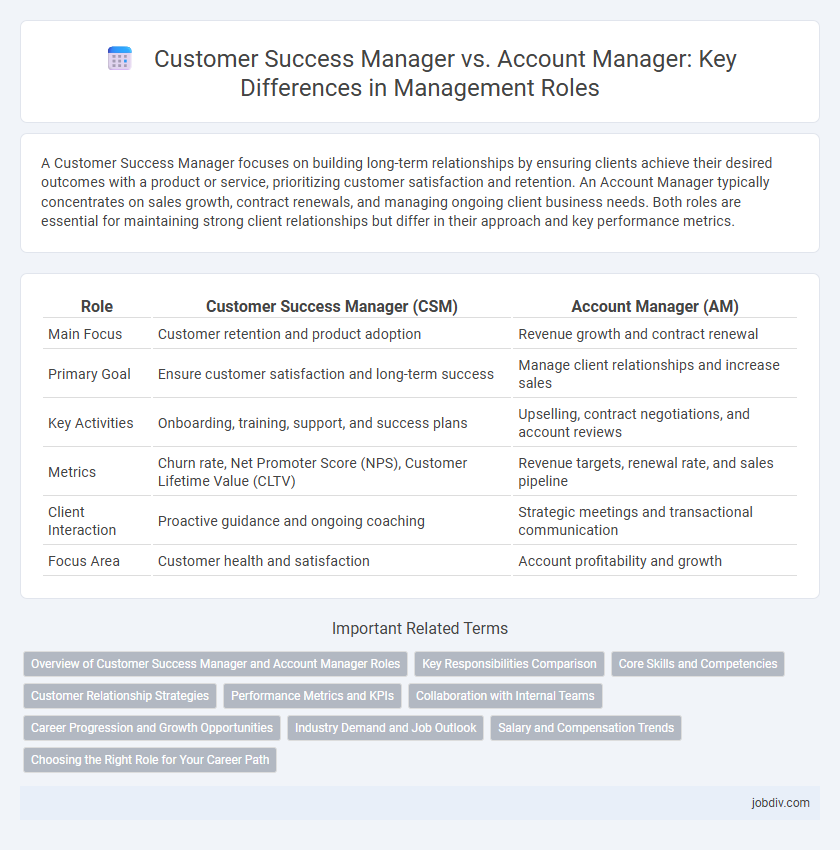A Customer Success Manager focuses on building long-term relationships by ensuring clients achieve their desired outcomes with a product or service, prioritizing customer satisfaction and retention. An Account Manager typically concentrates on sales growth, contract renewals, and managing ongoing client business needs. Both roles are essential for maintaining strong client relationships but differ in their approach and key performance metrics.
Table of Comparison
| Role | Customer Success Manager (CSM) | Account Manager (AM) |
|---|---|---|
| Main Focus | Customer retention and product adoption | Revenue growth and contract renewal |
| Primary Goal | Ensure customer satisfaction and long-term success | Manage client relationships and increase sales |
| Key Activities | Onboarding, training, support, and success plans | Upselling, contract negotiations, and account reviews |
| Metrics | Churn rate, Net Promoter Score (NPS), Customer Lifetime Value (CLTV) | Revenue targets, renewal rate, and sales pipeline |
| Client Interaction | Proactive guidance and ongoing coaching | Strategic meetings and transactional communication |
| Focus Area | Customer health and satisfaction | Account profitability and growth |
Overview of Customer Success Manager and Account Manager Roles
Customer Success Managers focus on ensuring clients achieve desired outcomes through continuous support and relationship building, driving customer retention and satisfaction. Account Managers primarily handle sales growth and contract renewals by managing client portfolios and identifying upselling opportunities. Both roles require strong communication and problem-solving skills but differ in their approach to client engagement and business objectives.
Key Responsibilities Comparison
Customer Success Managers focus on driving product adoption, ensuring customer satisfaction, and reducing churn through proactive support and relationship-building. Account Managers prioritize managing sales processes, contract renewals, and upselling opportunities to maximize revenue within existing client accounts. Both roles collaborate closely with clients but emphasize different aspects: Customer Success centers on long-term value delivery, while Account Management targets business growth and sales targets.
Core Skills and Competencies
Customer Success Managers excel in proactive relationship building, deep product knowledge, and customer lifecycle management to drive retention and satisfaction. Account Managers focus on sales expertise, contract negotiation, and maintaining client portfolios to maximize revenue growth. Both roles require strong communication, problem-solving skills, and the ability to align business goals with customer needs for successful management.
Customer Relationship Strategies
Customer Success Managers prioritize long-term customer growth by proactively addressing client needs and ensuring product adoption, which enhances retention rates and lifetime value. Account Managers focus on maintaining ongoing client communications, managing contract renewals, and driving sales opportunities within existing accounts. Both roles employ tailored customer relationship strategies, but Customer Success Managers emphasize strategic partnership and value realization, while Account Managers concentrate on transactional management and revenue expansion.
Performance Metrics and KPIs
Customer Success Managers primarily track metrics like customer retention rate, Net Promoter Score (NPS), and customer lifetime value (CLV) to ensure ongoing client satisfaction and long-term engagement. Account Managers focus on sales performance indicators, such as revenue growth, upsell/cross-sell rates, and quota attainment, reflecting their responsibility for driving business expansion within existing accounts. Both roles use these KPIs to measure success, but Customer Success emphasizes relationship health while Account Management targets financial outcomes.
Collaboration with Internal Teams
Customer Success Managers collaborate closely with product, sales, and support teams to ensure customer satisfaction and long-term retention, focusing on proactive problem-solving and value delivery. Account Managers work alongside marketing, finance, and sales departments to drive revenue growth and manage contractual obligations, emphasizing customer acquisition and upselling strategies. Both roles require strong interdepartmental communication to align company goals with client needs and optimize overall account performance.
Career Progression and Growth Opportunities
Customer Success Managers and Account Managers offer distinct career paths within management, with Customer Success Managers typically focusing on long-term client relationships and ensuring product adoption, leading to opportunities in strategic client management or customer experience leadership. Account Managers often concentrate on sales targets and revenue growth, paving the way for advancement into senior sales roles or business development management. Growth opportunities in both roles are robust, emphasizing skills in communication, negotiation, and strategic planning for career progression into executive positions.
Industry Demand and Job Outlook
Customer Success Managers (CSMs) are experiencing higher industry demand due to the growing emphasis on long-term client retention and subscription-based business models, particularly in SaaS and technology sectors. Account Managers remain crucial in traditional sales-driven industries, but the job outlook shows a shift towards roles that combine relationship management with proactive customer success strategies. Market projections indicate a faster growth rate for Customer Success Manager positions, driven by companies prioritizing customer experience and reducing churn.
Salary and Compensation Trends
Customer Success Managers typically earn between $65,000 and $110,000 annually, with bonuses often tied to customer retention metrics, reflecting a growing emphasis on long-term client value. Account Managers' salaries range from $55,000 to $100,000, with commissions linked directly to sales revenue and new business acquisition, highlighting a performance-driven compensation structure. Recent trends show Customer Success Managers increasingly receiving equity stakes and performance bonuses, aligning with companies' strategic focus on customer lifetime value over immediate sales.
Choosing the Right Role for Your Career Path
A Customer Success Manager focuses on ensuring long-term client retention and satisfaction by proactively addressing customer needs and driving product adoption, making it ideal for those passionate about relationship-building and problem-solving. An Account Manager primarily handles sales targets and contract renewals, emphasizing revenue growth and negotiation skills, suited for professionals targeting business development and sales expertise. Choosing the right role depends on whether you prefer a strategic, customer-centric approach or a results-driven sales focus to align with your long-term career objectives.
Customer Success Manager vs Account Manager Infographic

 jobdiv.com
jobdiv.com